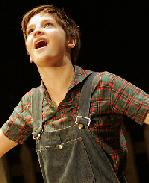SITE GUIDE
SEARCH
REVIEWS
REVIEW ARCHIVES
ADVERTISING AT CURTAINUP
FEATURES
NEWS
Etcetera and
Short Term Listings
LISTINGS
Broadway
Off-Broadway
NYC Restaurants
BOOKS and CDs
OTHER PLACES
Berkshires
London
California
New Jersey
DC
Philadelphia
Elsewhere
QUOTES
TKTS
PLAYWRIGHTS' ALBUMS
LETTERS TO EDITOR
FILM
LINKS
MISCELLANEOUS
Free Updates
Masthead
Writing for Us
A CurtainUp  London Review
London Review
 London Review
London ReviewThe Member of the Wedding
|
Now for the first time I realize that the world is certainly — a sudden place.— Frankie
|

Flora Spencer-Longhurst as Frankie
(Photo: Young Vic Press Office) |
Adapted by McCullers from her novel, the play shows the bond between a young white girl, Frankie (Flora Spencer-Longhurst) and the black maid Berenice (Portia) who cares for her and acts as her confidante and mentor. It has a universal and undated theme in showing how the relationship between child and carer ends when one outgrows the other. Almost stealing the show are Theo Stevenson/James Wilson/Ethan Brooke as Frankie's cousin, John Henry West, charming with quirky individuality. Set in the 1940s, the audience of 2007 are conscious how soon the civil rights movement will start to slowly change the type of society portrayed here.
The play is essentially a two hander between the volatile Frankie who finds herself in that awkward, gawky, no woman's land between childhood and adulthood and Berenice, four husbands down the line and fulfilled through the children she cares for, rather than her own family. Frankie has grown up without her mother who died the day she was born. Her elder brother Jarvis (Cian Barry) is getting married to Janice (Sarah Goldberg) and Frankie convinces herself that she will run away with them on their wedding day.
It's all slow and atmospheric, with a feeling of the inactivity dictated by the oppressive humidity of the Deep South. Matthew Dunster's production makes the most of this with the simple wooden house with porch and leafy arbour of Robert Innes Hopkins' set. I've looked at the words of the original novel and they draw you in with evocatively descriptive passages which I think are harder to recreate dramatically. (For example: "It was almost five o'clock and the geranium glow had faded from the sky. The last pale colours were crushed and cold on the horizon. Dark, when it came, would come on quickly, as it does in wintertime." ) The original play was shown as three acts, but with London being more accustomed to a single interval, the first two acts are shown here before the interval, which makes the last act very short. We get small cameos of the other characters which I would have liked to have savoured longer: John Henry's mother Mrs West (Danièle Lydon) falls in with her glass of Bourbon in hand, in which presumably to bury her disappointment and Frankie's father, the store owner Mr Addams (Richard Brake) who turns on Berenice's son Honey (John Macmillan) and jars with a shockingly racist remark, letting us know who runs the South.
The two main female characters are so well played that they light up the production. American actor, Portia as the black maid, Berenice, is believable and full of kitchen table wisdom. Her insight and faultless logic guides Frankie but inevitably, Frankie finds friends of her own age and moves on, leaving Berenice behind and having resigned her employment. Flora Spencer-Longhurst has the very difficult role which she pulls off well as the androgynous teenager, gauche, clumsy and unsophisticated. Frankie has to be unreasonable, quixotic and vulnerable with the rush of hormones that signify the onset of womanhood.
Special mention must be made of the boys playing John Henry who is as natural, underplayed and as un-childstar like as any child actor could be. I shall always be able to picture him sitting at the table, while Berenice and Frankie talk, with a napkin covering his face, as he tries to appear not to be listening to their conversation which he knows does not concern him. And when he comes in for his final scene wearing the fairy costume, there is no-one in the audience who can fail to smile.
|
THE MEMBER OF THE WEDDING
Written by Carson McCullers Directed by Matthew Dunster Starring: Portia, Flora Spencer-Longhurst With: Cian Barry, Theo Stevenson/James Wilson/Ethan Brooke, Sarah Goldberg, Richard Brake, Danièle Lydon, Katie Angelou, Kate Louise Williams, Alibe Parsons, Anthony Warren, John Macmillan, Henry McMorrow Design: Robert Innes Hopkins Lighting: Philip Gladwell Original Music Olly Fox Sound: Paul Arditti Running time: Two hours 30 minutes with one interval Box Office: 020 7928 6363 Booking to 20th October 2007 Reviewed by Lizzie Loveridge based on 17th September performance at the Young Vic. The Cut, London SE1 (Rail/Tube: Waterloo, Southwark) |
|
London Theatre Tickets Lion King Tickets Billy Elliot Tickets Mary Poppins Tickets Mamma Mia Tickets We Will Rock You Tickets Theatre Tickets |




